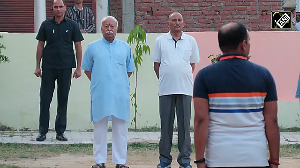Till the time 50 per cent of your kidney fails, there are no obvious symptoms, says Dr Amjad Khan Pathan.

Photograph: Pixabay.com
When we think of kidney problems the first thing that comes to our minds is kidney stones.
Did you know that there are far worse kidney problems than stones?
In simple terms, kidneys function like a filtering unit in the body.
When kidneys fail, harmful substances accumulate in the body.
Fortunate or not, nature has given us ample reserve and alternatives to make up for the poor functioning of kidneys.
As a result, till the time 50 per cent of your kidney fails, there are no obvious symptoms.
This makes early detection of kidney problem of paramount importance.
Some of the leading kidney problems Indians face are listed below:
1. Urinary tract infection
2. Diabetic kidney disease
3. Prostate in elderly male
4. Drug related kidney problems
5. Congenital /genetic abnormality of kidney and urinary tract
This is one of the most common and also the most neglected kidney problems.
It can manifest as simple burning in urine or desire to pass urine frequently. But if overlooked and not treated with proper antibiotics, this condition can progress to urosepsis and pyelonephritis.
Urine infection is more common in women than men.
It is also more common in diabetics.
If you see any symptoms like burning sensation in urine, fever, abdominal pain or vomiting, you should consult your doctor.
You may be asked for your urine examination to identify the infection so as to adequately treat you with antibiotics.
2. Diabetic kidney disease
India has become the world capital for diabetes with incidences increasing day by day.
Diabetes is one of the most common causes of renal failure in our country.
Due to high sugar in blood, there is hyperfiltration in kidney, because of which there is leakage of protein in urine.
This is the first step in kidney damage and if adequate treatment is given,00 kidney problem can be reversed.
Regular follow up and good control of sugars in diabetics can prevent you from developing renal failure.
3. Prostate in elderly
All his life, he slept like a stone. But now, there's an annoying trip to the bathroom every night, sometimes once or twice a night.
This is the common scenario of a patient suffering from prostate problem.
Prostate is a small gland located at the neck of urinary bladder in men.
By the age 60, over one-half of men have enlargement of prostate.
By 85, the number climbs to 90 per cent.
Symptoms may include trouble starting a stream of urine, leaking or dribbling.
Detection and treatment of enlarged prostate is important.
If untreated, it can cause repeated urine infection and in certain cases may be detected to be cancerous.
Prostate cancer, if detected early, can be completely treated.
In case of senior citizens, removal of prostate by surgery may give relief.
4. Drug related kidney problem
Every minute 20 per cent of total blood pumped by the heart (1200 ml blood) enters both kidneys for purification.
Among all organs of the body, the kidney receives the highest amount of blood per kilogram weight of the organ.
Because of this rich blood supply, harmful drugs and substances are delivered to the kidney in a large amount and in a short time.
If you are not careful about what you eat, this can also damage the kidney.
The habit of routinely popping a pill for pain relief, for example can cause serious damage to the kidneys.
Also use of alternative ayurvedic, homeopathic, herbal medicines without proper prescription are known to contain heavy metals that may do more harm to the body than good.
The golden rule is never self medicate.
Always consult a registered medical practitioner to be aware of side effects and take necessary precaution.
5. Congenital and genetic abnormality
Genetic abnormality can affect people at different ages beginning from the mother's womb to old age.
Diagnosing it early is essential for taking correctable measures.
For example, if post urethral valve is detected early by ultrasound in a newborn, it can potentially prevent kidneys from failing in a young child.
Likewise, many developmental disorders of the kidneys can be resolved by timely intervention.
Similarly genetic disorder like adult polycystic kidney disease will only manifest after 30 years of age and cause renal failure by 50 years.
So it is extremely important to screen relatives of patient with renal failure for genetic causes.
 Lead image published for representational purposes only.
Lead image published for representational purposes only.
Dr Amjad Khan Pathan is consultant nephrologist and transplant physician at Jaslok Hospital and Research Centre, Mumbai.












 © 2025
© 2025